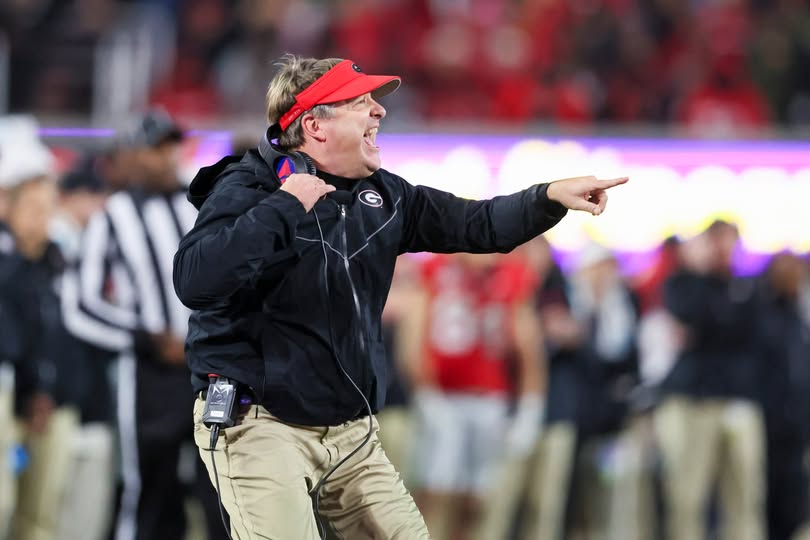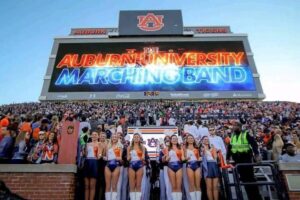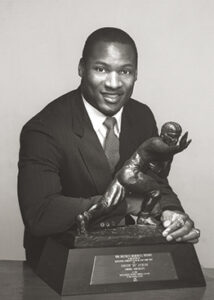
Georgia head coach Kirby Smart reacts to a play during their game against Mississippi at Sanford Stadium, Saturday, November 11, 2023, in Athens, Ga. Georgia won 52-17. (Jason Getz / Jason.Getz@ajc.com)
Kirby Smart, the head coach of the University of Georgia football team, has made it clear that his priority is building a culture that emphasizes teamwork, unity, and hard work, rather than catering to the individual financial interests of players through the new NIL (Name, Image, Likeness) era. This philosophy became particularly evident in the aftermath of the loss of a high-profile, five-star recruit, which sent ripples through the college football world. Despite the lucrative opportunities now available for college athletes, Smart has remained steadfast in his belief that the long-term success of a program is best achieved by putting the team first, ensuring that every player, regardless of their star status or financial potential, is working toward the same goal.
The rapid rise of NIL deals has changed the landscape of college athletics in ways that were previously unimaginable. No longer are college athletes restricted by the same rules that governed their financial opportunities in the past. Instead, they can now profit from their name, image, and likeness through sponsorships, social media deals, merchandise sales, and other revenue-generating opportunities. While this new model offers athletes significant financial freedom, it has also introduced a host of challenges for coaches and administrators who must navigate this new reality. Kirby Smart, known for his disciplined approach to coaching and his focus on team unity, has been vocal about the risks that come with this new era of college football.
One of the most significant concerns for Smart is the potential disruption of team dynamics that can result from NIL deals. In particular, he has expressed concern about the growing disparity between the financial compensation of younger players, especially freshmen, and that of older, more experienced players. Smart has made it clear that he believes freshmen should not earn more than seniors, a stance that speaks to his commitment to maintaining a level of respect and hierarchy within the team. In the past, players earned their place on the field through hard work, skill development, and dedication to the team. Under the new NIL framework, however, some freshmen have been able to secure lucrative deals before even stepping onto the field, creating an imbalance in the team structure.
The issue came to the forefront when Georgia lost a highly coveted five-star recruit to another program that reportedly offered the player significant NIL opportunities. While the loss was disappointing, it was not a moment of despair for Smart. Instead, he used it as an opportunity to reaffirm his commitment to the principles that have guided his success as a coach. Smart made it clear that while NIL deals may be a part of the game, they would not dictate the direction of his program. His message was unequivocal: players who are solely motivated by financial gain would not find a home at Georgia.
Smart’s emphasis on team culture over individual profit is rooted in his belief that success in football is not achieved by individual brilliance alone. Football, as a team sport, requires players to put the needs of the team above their own desires, and Smart has consistently emphasized the importance of shared sacrifice and collective effort. In his eyes, a player’s value is determined not by the amount of money they can make off the field, but by the contributions they make to the team’s success. This philosophy is one of the reasons why Georgia has been able to maintain a high level of performance on the field under Smart’s leadership, including winning the 2021 College Football Playoff National Championship.
The loss of a five-star recruit, while significant, is not a fatal blow to Smart’s program. Georgia has long been known for its ability to recruit top-tier talent, and Smart has proven time and time again that he can develop players into stars regardless of their initial financial prospects. His success is a testament to his belief in the importance of developing a cohesive, disciplined team that works together to achieve common goals. Smart is not interested in creating a locker room filled with players who are more concerned about their individual earning potential than the success of the team. In his view, the best players are those who are committed to the team first and foremost, and he is willing to take a hardline stance to protect that principle.
The growing trend of freshmen securing lucrative NIL deals is a relatively new phenomenon, and it raises a number of important questions about the future of college athletics. As NIL deals continue to evolve and become more commonplace, the challenge for coaches like Smart will be to find ways to balance the financial realities of the new landscape with the traditional values of teamwork, discipline, and hard work. Smart’s approach, which prioritizes team culture over individual profit, may be seen as a response to the increasing commercialization of college football. His decision to keep the focus on the team rather than on individual financial gain may be one of the reasons why Georgia has been able to maintain its place as one of the top programs in the country.
While some may argue that NIL deals are an essential part of the modern college football experience, Smart’s perspective reflects a deeper concern about the long-term implications of this new model. He understands that college football is more than just a business; it is a platform for developing young men who will go on to succeed both on and off the field. Smart is deeply invested in the personal growth of his players, and he sees football as a means of teaching them life lessons that will serve them well beyond their time in college. In his mind, the most successful players are those who are willing to put the needs of the team ahead of their own personal desires. This approach, while perhaps less flashy than the individual-focused culture promoted by NIL deals, has proven to be highly effective in building a championship-caliber program.
It is worth noting that Smart’s emphasis on team culture is not just about football. He is also deeply concerned with the broader impact of NIL deals on the character and development of college athletes. The influx of money into the college sports landscape has the potential to alter the dynamics of player development in ways that go beyond the football field. In some cases, the lure of financial rewards may lead to a shift in priorities, with players becoming more focused on securing lucrative deals than on improving their skills or contributing to the success of the team. Smart is keenly aware of this risk and has made it clear that he will not allow his program to be defined by individual financial interests. Instead, he will continue to prioritize the values that have always been at the core of Georgia’s football program: teamwork, discipline, and a commitment to excellence.
In many ways, Smart’s stance on NIL deals reflects a broader cultural shift within college athletics. As the NCAA continues to grapple with the implications of NIL, coaches and administrators are faced with difficult decisions about how to navigate this new era. Some have embraced NIL as a way to empower athletes and provide them with financial opportunities that were previously unavailable. Others, like Smart, have raised concerns about the potential for NIL deals to disrupt the traditional team-oriented culture of college football. While the future of NIL remains uncertain, Smart’s approach offers a compelling vision for how college football programs can continue to thrive in a rapidly changing landscape.
Ultimately, Kirby Smart’s emphasis on team culture over individual NIL deals speaks to his belief in the enduring power of teamwork and discipline. While the financial opportunities available to college athletes are undoubtedly changing the game, Smart is determined to stay true to the values that have guided his coaching career. His focus on creating a cohesive, hard-working team that values collective success over individual glory is a reminder that, in the end, it is not the money that defines a successful football program—it is the strength of the relationships between the players, coaches, and staff that ultimately determines whether a team can achieve greatness. Despite the growing influence of NIL in college sports, Smart remains committed to the idea that the most successful teams are those that prioritize unity, discipline, and a shared commitment to excellence above all else.





